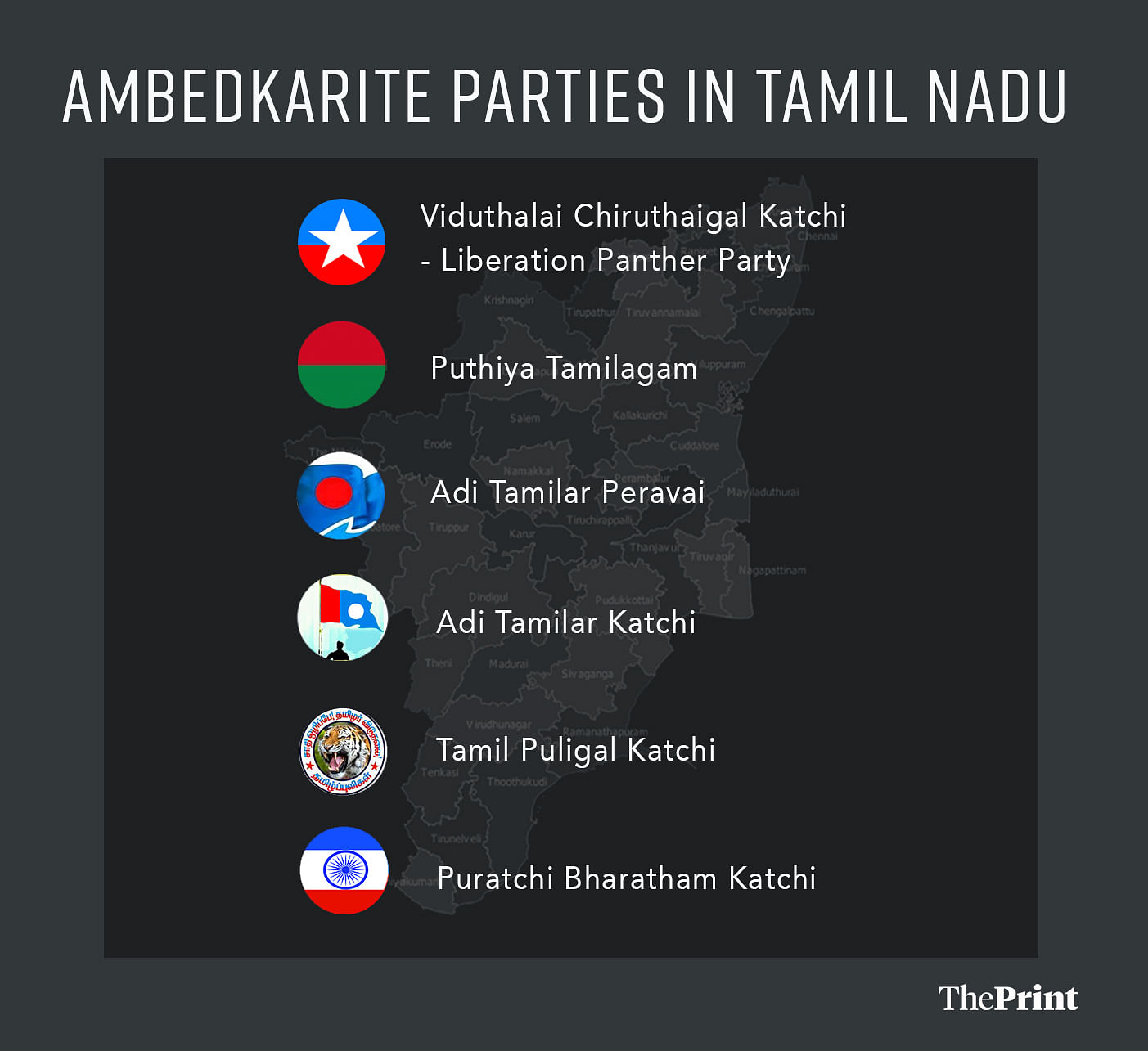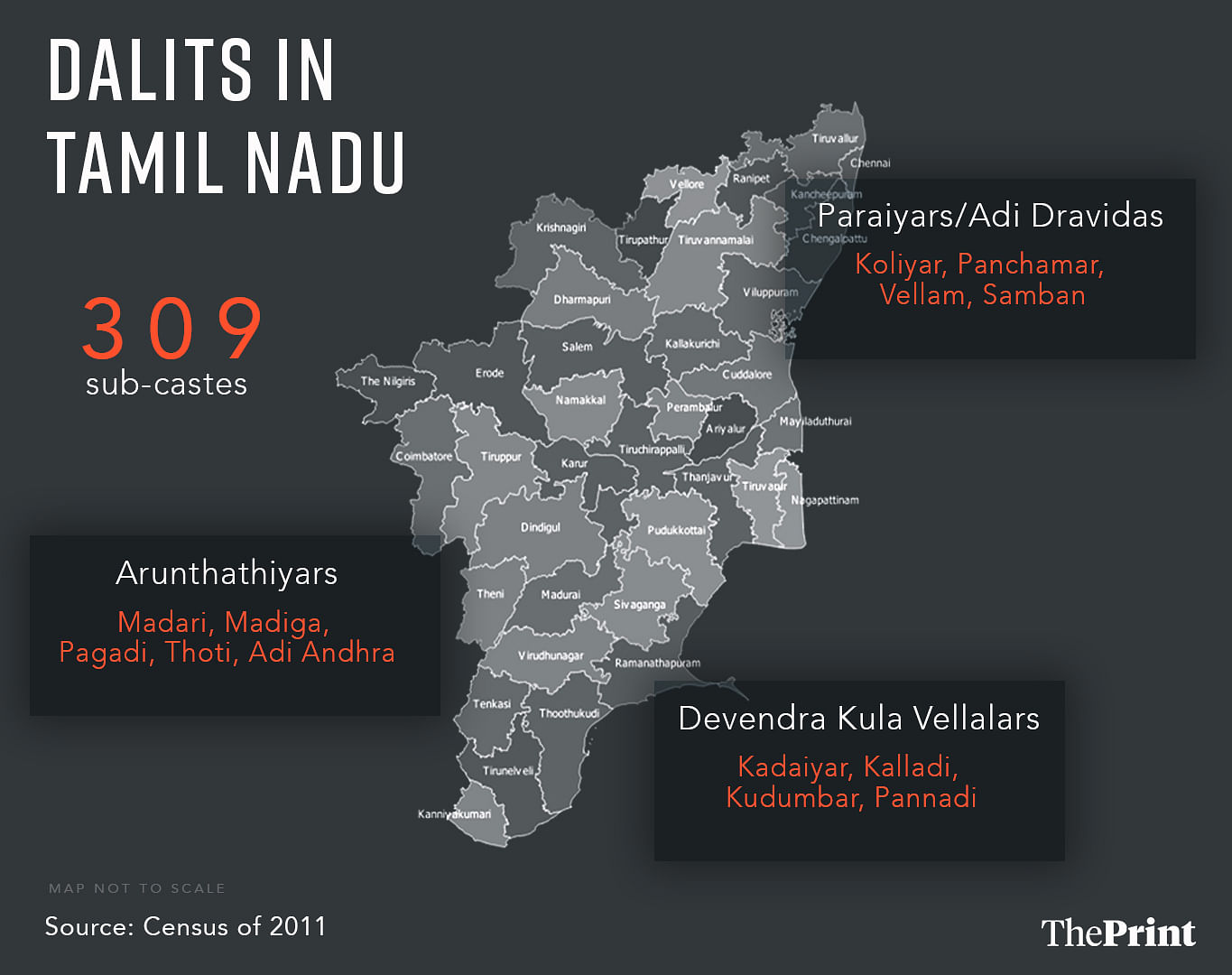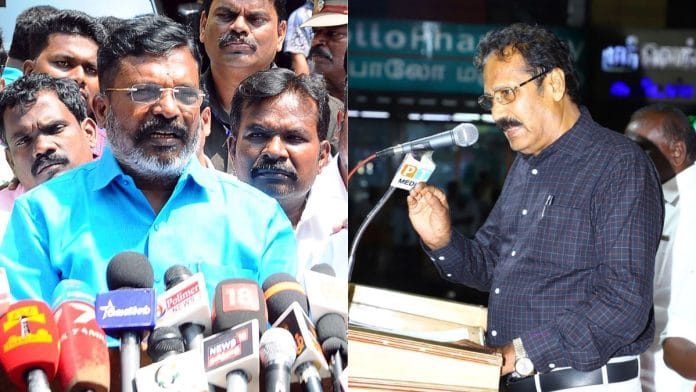Chennai: A murder and the Supreme Court judgment allowing sub-quotas within Scheduled Castes and Scheduled Tribes have triggered a contest among Tamil Nadu’s two key Ambedkarite parties, which have been active participants in the state’s electoral politics.
Viduthalai Chiruthaigal Katchi (VCK) and Puthiya Tamilagam (PT) — both founded in the late 1990s to speak for Ambedkarite issues and to counter the two main Dravidian parties of Dravida Munnetra Kazhagam (DMK) and All India Anna Dravida Munnetra Kazhagam (AIADMK) — are jostling to project themselves as the party truer to the cause of the Dalits.
While VCK leader Thol. Thirumavalavan was batting for reservation for the Arunthathiyars within the SC category, arguing that the move would uplift the most underrepresented community, PT founder K. Krishnasamy called it a ploy to divide the Dalits.
Though both the leaders condemned the murder of Bahujan Samaj Party’s Tamil Nadu unit chief K. Armstrong, Thirumavalan stood with the grieving BSP supporters, while Krishnasamy kept away.
This is in stark contrast to the politics of the 1990s, when leaders of Dalit political parties usually spoke in the same tone.
The tussle has exposed the schism among Dalit parties, reigniting an old debate on whether it is possible for these political groups to unite.

Activists and political analysts that ThePrint spoke to said that though it is nearly impossible for these parties to unite under one umbrella, they could align themselves with a common movement subscribing to the Ambedkarite ideology, irrespective of their political alliances.
“It is the need of the hour to have a consolidated parent body for all the Ambedkarite parties to join together and discuss the issues of Dalits in the state,” said Dalit Panthers Iyakkam Document Centre founder Vinoth Malaichamy.
There are more than 10 Ambedkarite parties in Tamil Nadu, of which VCK and PT have been contesting elections actively. While VCK bagged a vote share of about 2.25 percent in the Lok Sabha polls, other parties, including PT, had a vote share of less than 0.5 percent.
According to the Tamil Nadu Household Panel Survey (Pre-Baseline Survey 2018-19), SCs constitute 23.7 percent of the population in Tamil Nadu.
However, for leaders of VCK, a DMK ally, the party has no difference in opinion with other Ambedkarite parties and openly accepts criticism by fellow comrades.
“But it is imperative to capture the political power for social change, which is not possible independently. So, we have an electoral alliance with the parties that are closer to our ideology,” said Sinthanai Selvan, VCK general secretary and MLA from Kattumanarkoil.
Also Read: How very similar clean chits in decade-old cases have now landed 2 DMK ministers back on trial
Opposing views on apex court order
The comradeship between Thirumavalavan and Krishnasamy dates back to the 1990s, when both leaders first began voicing the concerns of Dalit communities. Krishnasamy entered the political fray in 1996 as an independent candidate and went on to form the PT in 1998, while Thirumavalavan formed the VCK in 1999 and began contesting elections.
In Tamil Nadu, the Dalits with 309 sub-castes are primarily divided into 3 main categories — Paraiyars, Devendra Kula Vellalars, and Arunthathiyars. Paraiyars usually rally behind the VCK, and Devendra Kula Vellalars support the PT, besides the two Dravidian parties.

While those pleased with the Supreme Court order, which validated the Tamil Nadu law providing 3 percent reservation to the sub-castes under Arunthathiyars, have congratulated Chief Minister M.K. Stalin and DMK, those objecting to the idea say that it would divide the Dalits and appeal for a larger consolidation of the community in the state.
“The DMK-led state government’s move to give 3 percent reservation to Arunthathiyars in 2008 was to divide and rule the Dalit community. They did not want the 25 percent of Dalits in the state to consolidate under one umbrella,” Krishnasamy told ThePrint.
Back in 2008, following the recommendations of a committee headed by Madras High Court retired judge M.S. Janarthanam, the then DMK-led government had decided to implement the reservation for Arunthathiyars within the SC quota of 18 percent. The Arunthathiyars Reservation Act was implemented in 2009.
Meanwhile, VCK’s Thirumavalavan and prominent leaders from the Arunthathiyar community have applauded the judgment.
“Internal reservation within the SCs is a welcome move. We should, however, be cautious. Parties in power in the state and Centre should not use this for political gains,” Thirumavalavan said in a statement.
However, the rift within the Ambedkarite parties in Tamil Nadu is not the consequence of the apex court’s judgment alone. The murder of BSP leader Armstrong on 5 July had also sparked a row.
BSP leader’s murder
Armstrong’s murder led to huge uproar among the Dalit leaders. All of them spoke in unison, supporting the BSP, and condemning the murder and the state government.
Soon after, Ambedkarite filmmaker Pa Ranjith organised a massive memorial rally, seeking justice for the late BSP leader, under the banner of his venture ‘Neelam Publications’ on 20 July.
A day before the rally, Thirumavalavan took to Facebook urging VCK workers to refrain from participating in the rally, calling it an attempt to slam the VCK and its ally, the DMK.
In a public meeting after the rally, criticising Dalit leaders allied with Dravidian parties, Ranjith called for all Dalit and Ambedkarite forces to unite, irrespective of the party they belonged to. He also called those “dependent” on Dravidian parties “slaves”.
Though most of his criticism was aimed at the VCK and the DMK, Ranjith also said that he and his fellow Ambedkarites would never be against Thirumavalavan. Addressing the VCK chief, he said, “Anna, we will never be against you. You are our voice.”
In the debate over the rally, PT’s Krishnasamy largely remained silent as he has been in disagreement with both Thirumavalavan and Ranjith lately.
This friction, however, was just the tip of the iceberg.
Political commentator and assistant professor at Bengaluru’s National Law School of India University, Karthikeyan Damodaran, said that the work of Ambedkarite leaders, who are now in alliance with Dravidian parties, could not be weighted so low.
“The Dravidian hegemony was in top form when Thirumavalavan and Krishnasamy stepped into politics. They fought fire with fire and their efforts cannot be dismissed,” he said.
With respect to the call for consolidation of Ambedkarites, both Damodaran and Vinoth said that the perception that Dalits must vote only for Dalits is wrong.
Adding that Dravidian discourse speaks about inclusion, Damodaran said, “It has always kept Dalits on the fringes. But, to capture power, consolidation of Dalits would not be the solution, since all parties have a stake in the Dalit vote share.”
Vinoth called for a collective forum of Dalit leaders to consolidate and discuss the issues of the community, even if political decisions were excluded from the forum.
Also Read: Why Tamil Nadu’s latest spate of political murders isn’t very political
Ideological consolidation possible?
VCK has been in favour of the Supreme Court’s sub-classification verdict.
At a meeting with other Dalit parties after the order, Thirumavalavan had said, “There have been misconceptions that the VCK is against the reservation for Arunthathiyars. It is to create a bad reputation for the VCK among the community. The VCK has never been against the reservation of any community.”
On the other hand, the PT, the Republic Party of India and several other Dalit parties have opposed the verdict.
“This is the problem with the VCK and Thirumavalavan. They speak Ambedkarite politics in Delhi and talk Dravidian politics in Tamil Nadu. When all the Ambedkarite parties at the national level are against the internal reservation, VCK alone is supporting it,” said writer and Dalit activist Shalin Maria Lawrence.
Noting that it is understandable that the VCK is in alliance with the DMK, she wondered if the VCK should at least ideologically align with the Ambedkarite movements in the state.
However, Aathi Thamizhar Katchi founder Adhiyaman said that each party should be autonomous, just like Ambedkar wanted.
“Even Ambedkar did not want all the Dalits to consolidate. He wanted everybody to contest and capture political power. The Dalit uprising started in the 1990s, but later, the Ambedkarite leaders began showing their allegiance to a particular caste within the Scheduled Castes. That’s when we stepped in, to voice the concerns of the Arunthathiyars in western Tamil Nadu,” he said.
He added that the consolidation would neither democratise the Ambedkarite movements nor address the problems of all the sub-castes.
Nevertheless, Nagai Thiruvalluvan, leader of Tamil Puligal party, dominated by the Arunthathiyars, shared that the leaders of all the Ambedkarite parties are well connected and share good friendship.
“The difference in opinion between the Ambedkarite parties should not be seen as if they are opposing each other. We share the comradeship, but it is the electoral system that has forced us to be in alliance with the parties that are closer to our ideological views,” he said.
VCK leader Sindhanai Selvan also said that the party has no differences in terms of views with other Ambedkarite parties and movements. Blaming the electoral system for the alliance and the tactics they have adapted, Selvan said, “Sharing political power would solve the problems of the marginalised communities.”
He also recalled how the Liberation Panthers (Viduthalai Chiruthaigal) movement had boycotted the elections for a decade after its formation. “However, it did not have much impact as it did not have the political power.”
(Edited by Mannat Chugh)
Also Read: Not just wristbands, life in Tamil Nadu schools is caste-coded. Punishments to T-shirts






